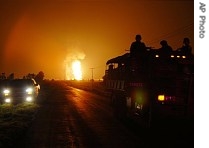2007年VOA标准英语-Bombing of Mexican Pipelines Puzzles Security E(在线收听)
Mexico CIty
26 July 2007
The July 5 and July 10 bomb attacks on natural gas pipelines in central Mexico led to the temporary shutdown of factories in several industrial cities and raised fears about the country becoming a target for terrorists. A small leftist insurgent group took responsibility for the attacks, but security experts are still puzzled over the incident and worry about possible future acts of sabotage. VOA's Greg Flakus has more from Mexico City.
 |
| Smoke and flames from an explosion at a gas pipeline are seen in the background as a Mexican army truck drives by near Queretaro, Mexico, 10 July 2007 |
But the attacks remain a mystery, and speculation continues as to who was really responsible. The EPR had never ventured that far north before and never appeared to have access to the explosives and bomb-making skills that were employed in these attacks.
Political analyst Ana Maria Salazar says she remains baffled by the bombings.
"I do not know what to make of it," she said. "That is part of the problem when you have these acts that are claimed to have been done by armed groups in Mexico, you always have a question in the back of your mind - who did it?"
She says it is possible the EPR might have carried out the attacks in conjunction with other leftist groups currently protesting in the southern state of Oaxaca over various issues. But she says she cannot rule out the possibility that a foreign terrorist group might have had a hand in it.
"There was a threat posted on a Web site a couple of months ago, supposedly by al-Qaida, that was threatening all the countries providing petroleum to the United States, which included Mexico and Venezuela, which made Hugo Chavez very upset, by the way," she added. "So there is that possibility."
Mexico City-based independent energy analyst David Shields is among those who see another possible culprit behind the bomb attacks, the powerful and violent drug trafficking cartels, against which President Calderon launched an offensive shortly after taking office last December.
"Once it was confirmed that these were terrorist attacks, first of all we thought of the drug cartels as the likely authors of these attacks," he explained. "I think we cannot rule out altogether that they were involved."
Shields says government efforts to protect the state-owned energy company's pipes and facilities are necessary, but he says posting soldiers along the pipeline routes will not provide complete protection.
"We know that Pemex has infrastructure of all kinds of pipelines, something like 60,000 kilometers of pipelines all over the country, as well as other kinds of facilities," he added. "I think it would even be out of the question to post a soldier every kilometer. It would be a massive waste of human resources to have people all over the country wherever there are pipelines, wherever there is infrastructure."
Shields says the Mexican government has provided adequate protection to its oil production and export infrastructure, even employing missile-equipped naval vessels to patrol waters near offshore oil platforms. But he says pipelines serving Mexico's own population are much more vulnerable.
"Certainly, none of us are ruling out the likelihood of more attacks, but also what we have to realize is that these attacks on domestic pipelines are affecting the domestic market, they are not affecting exports," he noted. "It would have to be a very different kind of attack and a more sophisticated attack on oil export facilities for oil exports to be interrupted. That seems to be an unlikely scenario."
While Mexico's oil export system may be safe, a continued threat to its domestic energy supply network could cripple important industries and discourage foreign investors who are considering placing plants here. Security experts who have examined evidence from the bombings say the perpetrators knew the attacks would disrupt important industries and that they probably had information from someone inside Pemex as to which pipes to bomb for the most effect.